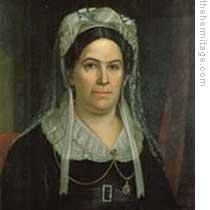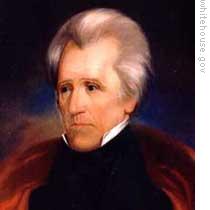VOA慢速英语 2008 1016b
时间:2019-01-11 作者:英语课 分类:VOA慢速英语2008(十)月

John Quincy Adams
The presidential campaign of eighteen twenty-eight was bitter and vicious 1, full of angry words and accusations 2. The old Republican 3 Party of Thomas Jefferson, James Madison and James Monroe had split 4 into two opposing groups. One group was led by President John Quincy Adams and Secretary of State Henry Clay. It called itself the National Republican Party. The other group was led by General Andrew Jackson. It called itself the Democratic Party.
This week in our series, Sarah Long and Steve Ember talk about the election of eighteen twenty-eight.
VOICE ONE:
Each party had its own newspapers. In Washington, the Daily National Journal supported President Adams. The United States Telegraph supported General Jackson. The Telegraph published charges against the administration made by congressional Democrats 5.
The Journal, in turn, published a pamphlet 6 that had been used against Jackson earlier. Among other things, the pamphlet charged that Jackson had fought a man, chased him away like a dog, and then took his wife. The charge was not true. This is the story. It is important, because it had a great effect on Andrew Jackson for the rest of his life.
VOICE TWO:

Rachel Donelson Jackson
Jackson met the young woman, Rachel, at her mother's home near Nashville, Tennessee. At the time, Rachel and her husband, Lewis Robards, were living there. They were having marriage problems. Robards argued with his wife about Jackson. He said she and Jackson seemed too close. Jackson was advised to leave, and he agreed to go.
Before he left, he met with Robards. Robards reportedly wanted to fight Jackson with his fists. Jackson refused to fist-fight. But, he said he would face Robards in a duel 7, if Robards wished to fight like a gentleman. Robards rejected the invitation, and nothing more happened between the two men. Jackson left.
VOICE ONE:
Robards and Rachel settled their differences. She went back to their home in Kentucky, but did not stay long. They had another dispute, and she left. Court records say she left with a man -- Andrew Jackson.
Rachel's family had heard how unhappy she was with Robards, and had asked Jackson to bring her back to Tennessee. Robards followed them. Rachel told him she wanted a divorce. Robards threatened her. He said he would carry her away by force if she did not go back to Kentucky. Rachel decided 8 to flee. She would go with some traders to Natchez, in the Mississippi territory. It would be a dangerous trip down the Cumberland, Ohio, and Mississippi rivers.
VOICE TWO:
Jackson was troubled. He felt badly, because he had been the cause of Rachel's unhappiness. By now, Rachel meant much to Jackson. He had fallen in love with her. When the traders asked him to go to Natchez, he agreed. The group left early in seventeen ninety-one.
A few weeks earlier, Lewis Robards had begun preparations for a divorce. He did not complete the necessary action, however. Yet he led Rachel's family to believe that he had. That the two of them were no longer married.
Jackson returned to Nashville after several months. He asked for permission to marry Rachel, now that she was free of Robards. Rachel's mother gave her permission.
VOICE ONE:

Andrew Jackson
Andrew Jackson and Rachel were married in August seventeen-ninety-one. Both were twenty-four years old. They remained in Tennessee. The next two years were busy ones for Jackson. As a young lawyer, he worked hard and traveled far.
In December, seventeen ninety-three, he discovered court papers showing that Lewis Robards had only recently divorced Rachel. This meant that at the time Jackson and Rachel were married, she was still legally married to Robards. Jackson was shocked. As soon as possible, he and Rachel were married again -- legally this time.
VOICE TWO:
Almost ten years passed. Jackson was a judge and took part in Tennessee politics. One day, Jackson met the state's governor outside the court house in Knoxville. The governor was telling a large crowd about his great services to the state.
Jackson felt it necessary to say that he, too, had done some public services. "Services," shouted the governor. "I know of no great service you have done the country except taking a trip to Natchez with another man's wife!"
Jackson's eyes grew as cold as ice. The governor pulled his sword. "Great God!" cried Jackson. "Do you speak her sacred name." He jumped at the governor with a stick. The two men were separated. A few years later, Jackson killed a man in a duel, after the other man made a joke -- while drunk -- about Jackson's marriage.
VOICE ONE:
As a candidate for president, Jackson could not take to the dueling 9 field to defend his wife's honor. He wanted to. But he knew it would prevent him from being elected.
Jackson asked a special committee of citizens to investigate his marriage and make a public report. The committee found that Jackson and Rachel got married only after they believed her first husband had divorced her.
As soon as the mistake was discovered, they were married again, legally. The report said they were not at fault.
VOICE TWO:

One of the "coffin 10 hand bills" published to attack Andrew Jackson during his presidential campaign. The coffins 11 represent the deaths Jackson's critics believed he caused during his military campaigns.
The pro-Jackson newspaper in Washington published the committee's report. But anti-Jackson newspapers did not. They insulted him and his wife.
General Jackson struggled to control his anger. "How hard it is," he said, "to keep myself away from these villains 12. I have made many sacrifices for my country. But being unable to punish those who lie about my wife is a sacrifice too great to bear."
Anti-Jackson newspapers continued to print vicious lies about him. And the pro-Jackson newspapers began to print vicious lies about President Adams and his wife.
VOICE ONE:
All during the bitter campaign, neither candidate said anything about one very important issue: slavery. Adams did not want to lose what little support he had in the South and West by denouncing 13 slavery. Jackson did not want to lose the support of some Republicans 14 in the North by openly defending it.
Adams's silence did not mean that he approved of slavery. Southerners were sure that he opposed it. And Jackson did not have to tell the South what he thought about slavery. He was a slave owner, and had bought and sold slaves all his life.
VOICE TWO:
There was another important difference between the two men and their political parties. President Adams and the Republicans represented the interests of those who owned property.
Many of the president's supporters felt that wealthy, property-owning citizens should control the government. They feared popular rule, or government elected by all the people.
Jackson and the Democrats represented the interests of common men. They did not feel that the rich had more right to govern than the poor. They believed in the democratic right of all men to share equally in the government.
VOICE ONE:
The election was held in different states on different days between October thirty-first and November fifth, eighteen-twenty-eight. In two states -- South Carolina and Delaware -- the legislature chose the presidential electors.
In all the other states, the electors were chosen by the voters. When the electoral votes were counted, Jackson received one hundred seventy-eight. Adams received only eighty-three. It was a great victory for Jackson.
VOICE TWO:
His wife, however, was troubled. She was a simple, kind woman who loved her husband. "For Mr. Jackson's sake," she wrote, "I am glad. For my own part, I never wished it." She knew, of course, of the charges made during the campaign about their marriage. Her courage supported her. But when the excitement of the election had ended, she lost her energy. And her health became worse.
Someone proposed that Rachel Jackson stay in Tennessee until her health became better. Then she could join her husband at the White House in Washington. Rachel did not want to go to Washington. But she felt that her place was with her husband. That will be our story next week.
(MUSIC)
ANNOUNCER:
Our program was written by Frank Beardsley. The narrators were Sarah Long and Steve Ember. Transcripts 15, MP3s and podcasts of our programs are online, along with historical images, at voaspecialenglish.com. Join us again next week for THE MAKING OF A NATION - an American history series in VOA Special English.
__
This is program #55 of THE MAKING OF A NATION
- He gave the dog a vicious blow with his stick.他朝着那只狗狠狠地打了一棍子。
- The author portrayed his father as a vicious drunkard.作者把他父亲描绘成一个可恶的酒鬼。
- There were accusations of plagiarism. 曾有过关于剽窃的指控。
- He remained unruffled by their accusations. 对于他们的指控他处之泰然。
- Some families have been republican for generations.有些家庭世代都支持共和党。
- A third candidate has entered the contest for the Republican nomination.第三个候选人已经加入角逐共和党提名的行列。
- Who told you that Mary and I had split up?谁告诉你玛丽和我已经离婚了?
- The teacher split the class up into six groups.老师把班级分成6个小组。
- The Democrats held a pep rally on Capitol Hill yesterday. 民主党昨天在国会山召开了竞选誓师大会。
- The democrats organize a filibuster in the senate. 民主党党员组织了阻挠议事。 来自《简明英汉词典》
- Over a thousand copies of the pamphlet have now been given out.现在已分发了一千多本小册子。
- The scholarly monographs were published as pamphlet.学术专著是以小册子形式出版的。
- The two teams are locked in a duel for first place.两个队为争夺第一名打得难解难分。
- Duroy was forced to challenge his disparager to duel.杜洛瓦不得不向诋毁他的人提出决斗。
- This gave them a decided advantage over their opponents.这使他们比对手具有明显的优势。
- There is a decided difference between British and Chinese way of greeting.英国人和中国人打招呼的方式有很明显的区别。
- When one's coffin is covered,all discussion about him can be settled.盖棺论定。
- The coffin was placed in the grave.那口棺材已安放到坟墓里去了。
- The shop was close and hot, and the atmosphere seemed tainted with the smell of coffins. 店堂里相当闷热,空气仿佛被棺木的味儿污染了。 来自辞典例句
- Donate some coffins to the temple, equal to the number of deaths. 到寺庙里,捐赠棺材盒给这些死者吧。 来自电影对白
- The impression of villains was inescapable. 留下恶棍的印象是不可避免的。 来自《简明英汉词典》
- Some villains robbed the widow of the savings. 有几个歹徒将寡妇的积蓄劫走了。 来自《现代英汉综合大词典》
- He saw the huge signs, listened to speeches denouncing himself and smiled. 他看见一些巨大标语,也听到一些抨击他的演讲,对此,他一笑置之。
- You must not think I am denouncing money. 你别以为我是在攻击钱。
- The Republicans got shellacked in the elections. 共和党在选举中一败涂地。
- The latest poll gives the Republicans a 5% lead. 最近的民意调查结果表明共和党领先了五个百分点。
- Like mRNA, both tRNA and rRNA are transcripts of chromosomal DNA. tRNA及rRNA同mRNA一样,都是染色体DNA的转录产物。 来自辞典例句
- You can't take the transfer students'exam without your transcripts. 没有成绩证明书,你就不能参加转学考试。 来自辞典例句